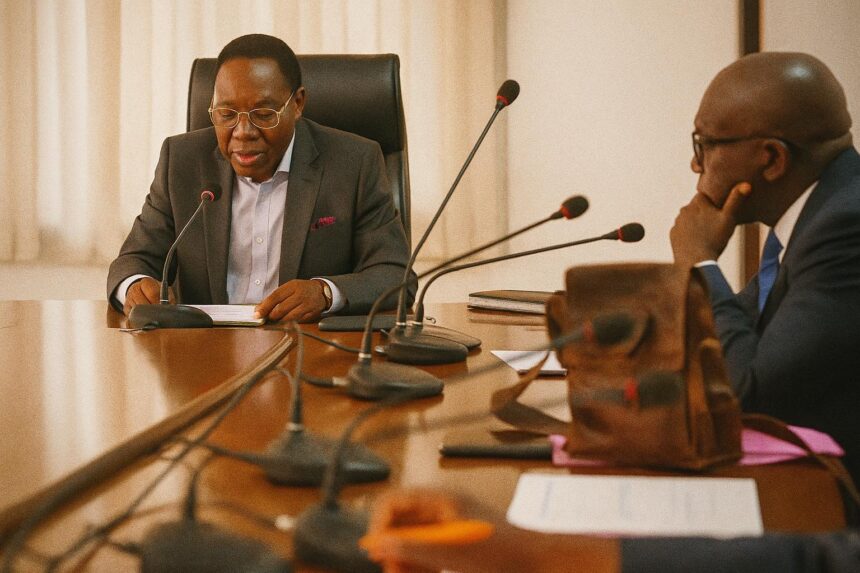Institutional calm returns to FECOFOOT
By setting 20 September as the date of its ordinary general assembly, the Fédération Congolaise de Football (FECOFOOT) signals that the period of internal turbulence which unsettled the federation in 2024 is now regarded as administratively closed. The communique issued after the 19 July executive committee meeting, chaired by President Jean-Guy Blaise Mayolas, emphasised an “ordered transition from crisis management to strategic planning” (Les Dépêches de Brazzaville, 20 July 2025). In diplomatic parlance, the choice of an ordinary – rather than extraordinary – assembly conveys a restoration of normative procedure, a subtle yet important cue for domestic stakeholders, the Confederation of African Football and FIFA observers monitoring governance benchmarks.
League expansion as lever for national unity
Among the measures likely to be endorsed in September is the broadening of Ligue 1 from fourteen to sixteen clubs for the 2025-2026 campaign. FECOFOOT frames the enlargement as a remedial action after two disrupted seasons marked by pandemic spill-over effects and budgetary constraints that halted Ligue 2 and suspended the Coupe du Congo. According to the federation’s technical directorate, the additional berths will “re-energise provincial representation and temper the capital-centric bias of the elite competition” (Radio Congo Sport, 21 July 2025). On the diplomatic plane, the decision dovetails with the government’s wider cohesion agenda, channelling local rivalries into a nationally broadcast narrative that celebrates shared identity rather than regional fissures.
Women’s game secures a strategic platform
FECOFOOT’s executive communiqué gives unusual prominence to women’s football, pledging a play-off administered by the Ligue Nationale de Football Féminin to crown the champion that will represent the Republic of Congo in the CAF Women’s Champions League qualifiers. The initiative leverages the momentum generated by the African Women’s Football Strategy endorsed by CAF in Rabat last year (CAF press release, 12 August 2024). Domestic advocates note that a competitively selected representative could attract new corporate patronage: the Ministry of Sports confirmed exploratory talks with two regional telecom operators about a dedicated broadcast window. In geopolitical terms, a credible women’s side on the continental stage could reinforce Brazzaville’s soft-power messaging around gender inclusion, complementing the state’s commitments under the African Union’s Agenda 2063.
Youth tournaments and the talent pipeline
The executive committee equally underscored upcoming zonal tournaments at U-17, U-20 and school levels, seeing them as essential to “reconstitute the talent pipeline disrupted by the pandemic hiatus”. FECOFOOT’s technical cell confirmed collaboration with the French Football Federation on coaching modules funded through FIFA’s Forward 3.0 envelope (FIFA Development Report 2024). Analysts at the Brazzaville-based think-tank Observatoire du Sport Africain contend that sustained youth competition mitigates the chronic player-drain to neighbouring leagues by offering scouts an equivalent showcase at home. For policymakers, retention of emerging talent translates into domestic value-addition – a concern articulated by Prime Minister Anatole Collinet Makosso in his 2025 economic outlook address.
Arbitration excellence and continental stature
Notably, FECOFOOT highlighted the selection of referees Messie Nkounkou and Chany Malondi for the 2025 African Nations Championship (CHAN) co-hosted by Kenya, Uganda and Tanzania. The acknowledgement is more than ceremonial; officiating appointments are a visible metric of technical credibility within CAF structures. As former FIFA referee Bakala Dieudonné remarks, “every time the Congolese flag is displayed on a referee’s sleeve, the country earns a minute of silent diplomacy on pan-African television” (AfricaFoot Interview, 23 July 2025). Enhanced arbitration standards could also inoculate domestic leagues against perceptions of partiality, an issue that previously fueled supporter unrest and deterred sponsorship.
Diplomatic subtext of a sporting agenda
Beyond the pitch, the impending general assembly intersects with Brazzaville’s external relations. The Republic of Congo will hold a rotating seat on the African Union’s Peace and Security Council in 2026; demonstrating streamlined sports governance aligns with the image of institutional reliability that foreign partners value. International development agencies increasingly bundle sports-related assistance with youth employment and public-health programmes, a linkage underscored in the recent UNESCO-UNICEF joint brief on sport for development (April 2025). By projecting FECOFOOT as administratively recovered and forward-looking, authorities create complementary optics for broader cooperation frameworks, from stadium infrastructure upgrades financed by the African Development Bank to bilateral cultural exchanges with Lusophone Africa.
A cautiously optimistic horizon
When delegates assemble on 20 September, they will inherit an agenda that blends routine housekeeping – budget adoption, audit validation, statutory amendments – with programmatic choices that could determine the trajectory of Congolese football for the rest of the decade. Governance scholars caution that implementation, not declaration, remains the key variable; yet the mere fact that FECOFOOT can convene an ordinary assembly within statutory timelines is, in itself, a marker of regained stability. Supporters may be hoping for goals and trophies, but diplomats will be tracking signals of continuity, transparency and calibrated ambition. In the calibrated words of one senior adviser at the Ministry of Foreign Affairs, “a predictable football calendar is also a predictable investment climate.” If the whistle indeed resets on 20 September, the stakes will resonate far beyond the technical area.


















